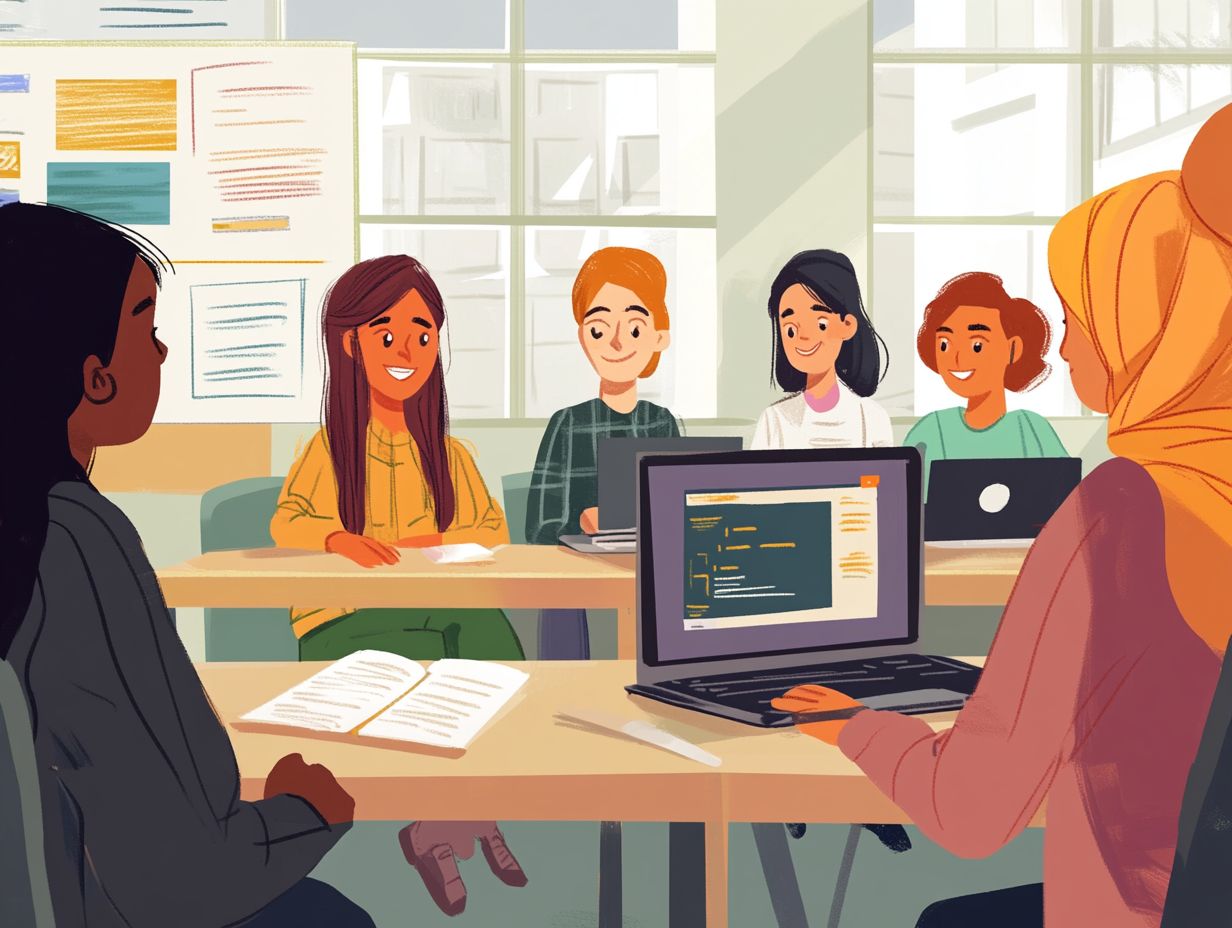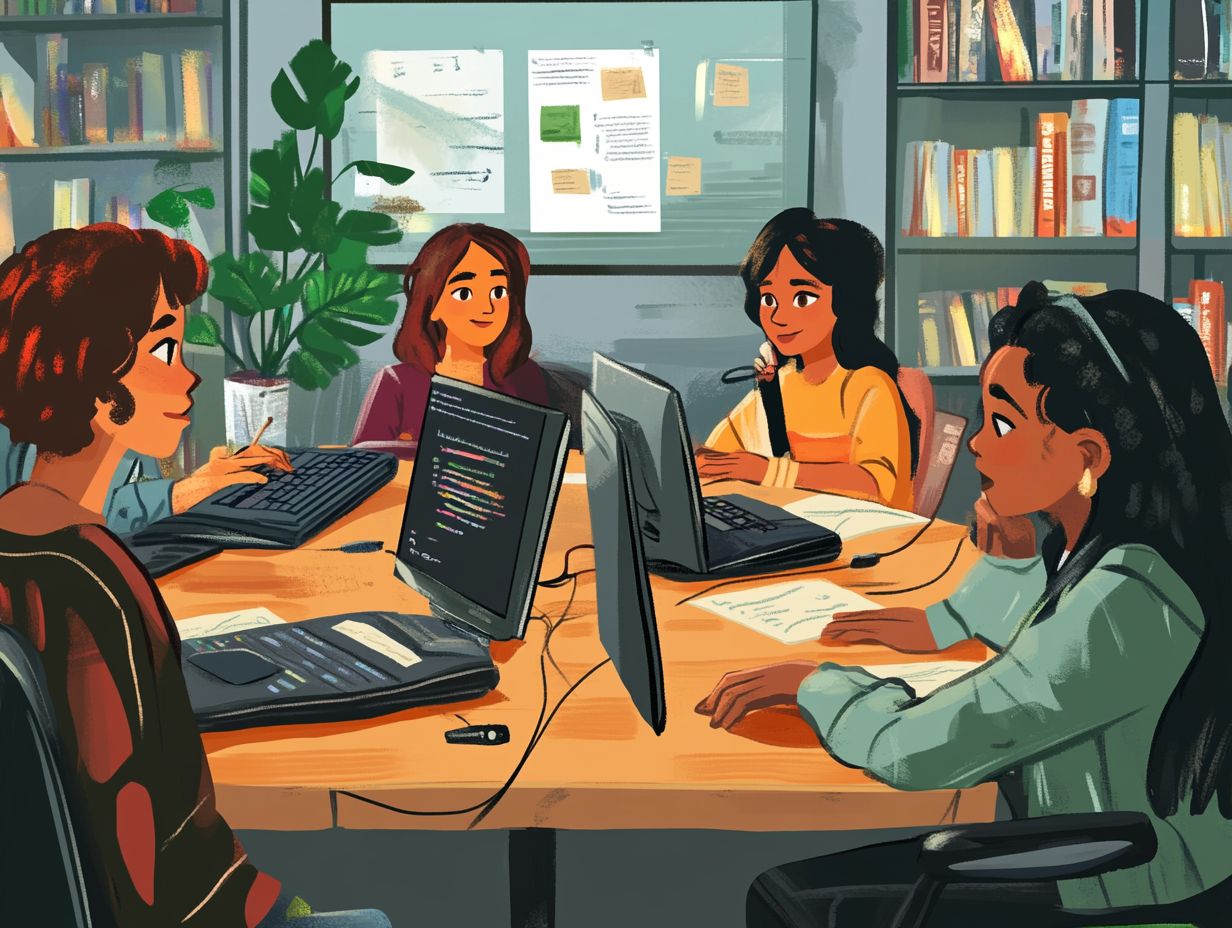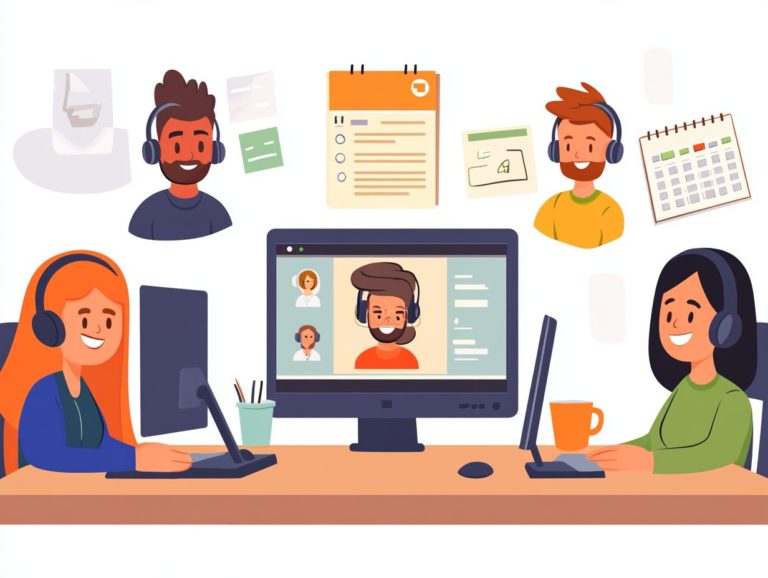How Online Master’s Programs Promote Inclusivity
In today’s rapidly evolving educational landscape, the importance of inclusivity in higher education is paramount. Embracing diversity enriches your learning experience and creates a fairer society.
Online master’s programs are leading the charge in promoting inclusivity through flexible learning options, diverse student bodies, and accessible resources. While challenges remain like technological barriers and the need for equal opportunities these programs are making significant strides.
This article explores how online master’s programs foster inclusivity and the positive impact on you as a student and the wider community.
Contents
- Key Takeaways:
- The Importance of Inclusivity in Higher Education
- How Online Master’s Programs Promote Inclusivity
- Challenges and Solutions for Inclusivity in Online Master’s Programs
- Impact of Inclusivity in Online Master’s Programs
- Frequently Asked Questions
- 1. What is inclusivity and why is it important in online Master’s programs?
- 2. How do online Master’s programs promote inclusivity?
- 3. Can online Master’s programs accommodate students with disabilities?
- 4. How do online Master’s programs ensure equitable access to education?
- 5. What measures do online Master’s programs take to address unconscious bias?
- 6. How can I determine if an online Master’s program is truly inclusive?
Key Takeaways:

- Diversity and inclusion are essential in higher education to create a more equitable and accepting learning environment.
- Online master’s programs promote inclusivity through flexible learning options, diverse student bodies, and accessible resources and support.
- Technological barriers and equal opportunities must be addressed to ensure inclusivity in online master’s programs.
- Inclusivity in online master’s programs benefits both students and society by creating a more diverse and accepting workforce.
The Importance of Inclusivity in Higher Education
Inclusivity in higher education is a cornerstone for cultivating a rich and diverse learning environment. It champions educational equity and equips you for leadership roles in a global society.
By embracing diverse backgrounds and perspectives, institutions elevate academic excellence and foster a culture of empathetic leadership. This is essential for achieving your career objectives and enhancing your skills across various fields.
As the demand for fair hiring practices and inclusive educational policies rises, universities must adapt their curriculum and teaching strategies to meet these changing needs.
Understanding the Need for Diversity and Inclusion
Recognizing the importance of diversity and inclusion in higher education means understanding how vital diverse hiring practices are for shaping an active academic community.
By actively embracing a variety of perspectives among educators, you can help create an environment that enriches learning and prepares students for the diverse world they will navigate.
Educational directors and principals play a critical role in this process. They implement policies that promote inclusivity, ensuring that every voice is heard and valued. This approach enhances educational outcomes for students and significantly impacts community economies.
Through community service initiatives, schools can bridge gaps between different demographic groups. This leads to stronger partnerships that ultimately drive economic development. A well-rounded education contributes to a more skilled and adaptable workforce.
How Online Master’s Programs Promote Inclusivity
Online master’s programs offer a transformative journey in higher education. They provide flexible courses that cater to diverse learning styles while supporting students from all backgrounds.
Now, you can chase your advanced degree without putting life on hold! These programs enhance accessibility to higher education for a wider audience.
The inclusion of teaching licenses and specialized tracks, like special education, improves the learning experience. This equips graduates to effectively address the distinct needs of their communities.
Flexible Learning Options

Flexible learning options in online master’s programs enable you to pursue your career aspirations while skillfully balancing work and study. This adaptability is especially advantageous when you re juggling full-time jobs, family responsibilities, or other commitments!
For example, programs like the online Master of Business Administration from leading universities allow you to customize your schedule. This gives you the freedom to access coursework whenever it suits you. Similarly, the Master of Public Health program features classes you can attend at your own pace, rather than at set times.
These choices support your academic journey and promote career growth. They enable you to seamlessly integrate newly acquired skills and knowledge into your professional landscape, fostering advancement and unlocking new opportunities!
Diverse Student Body
A diverse student body in online master’s programs significantly enriches your educational experience. It brings together individuals from various backgrounds, enhancing your understanding of different cultures.
This variety cultivates a vibrant learning environment and equips you with a broader perspective that is invaluable in today s global job market. As you graduate, you ll emerge with enhanced problem-solving skills and the ability to collaborate across cultures!
Many institutions are actively implementing initiatives that promote diverse hiring practices and cultural competence training. You ll be well-prepared not just to enter the workforce but to truly thrive in it.
Such practices reflect a commitment to diversity that can sway the hiring decisions of progressive companies, positioning you as a favored choice in a competitive landscape.
Accessible Resources and Support
Accessible resources and support systems in online master’s programs play a crucial role in creating an inclusive educational experience. They allow you to succeed no matter your circumstances.
These resources can take many forms, from personalized tutoring services that give you one-on-one attention to counseling options that tackle both academic and personal challenges. Strong technical support is also essential, ready to assist with any issues you might encounter on online platforms.
You ll find that having educational directors actively overseeing these resources makes a significant difference. They ensure that support is not only available but also tailored to meet diverse needs.
By coordinating efforts among various departments, they foster a supportive environment that promotes both academic excellence and personal growth. Ultimately, these initiatives contribute to a well-rounded educational journey, enabling you to thrive in your pursuits!
Challenges and Solutions for Inclusivity in Online Master’s Programs
Even with the myriad benefits of online master’s programs, you must confront challenges head-on, like technological barriers and the pressing need for fair chances for everyone.
These obstacles present significant hurdles in the pursuit of true inclusivity in higher education.
Addressing Technological Barriers

Addressing technological barriers is essential for ensuring that you and all online students have equal access to educational resources and opportunities!
This challenge becomes particularly pronounced within various socioeconomic groups, where access to high-speed internet and necessary devices can differ significantly. For instance, students in rural areas may grapple with connectivity issues, while those from lower-income households might not have the latest technology, which can undermine their learning experiences.
Educational institutions have a pivotal role to play in bridging this divide. By forming partnerships with tech companies and local community organizations, they can work towards providing affordable devices, launching internet access initiatives, and offering technology literacy programs.
These collaborations can enable you and your peers to thrive academically in an increasingly digital landscape!
Ensuring Equitable Opportunities
Ensuring equitable opportunities in online master’s programs demands a robust framework for implementing Diversity, Equity, and Inclusion (DEI) efforts that promote academic excellence and foster job growth.
As you navigate the complexities of a diverse student body, the effectiveness of these DEI efforts becomes increasingly vital. Evaluating current initiatives helps pinpoint strengths and weaknesses in your approach, ensuring every student feels included and supported.
It s essential to closely examine areas such as recruitment practices, curriculum inclusivity, and access to resources. When DEI initiatives are refined and seamlessly integrated, they enhance the learning experiences of all participants.
This leads to increased collaboration and engagement among students from various backgrounds, enriching the overall educational landscape.
Impact of Inclusivity in Online Master’s Programs
Inclusivity in online master’s programs transforms lives and communities! It presents substantial benefits not only for students but also for society as a whole.
Such inclusivity fosters economic growth and opens up enriched community service opportunities, ultimately enhancing the collective experience for everyone involved.
Benefits for Students and Society
The advantages of inclusivity for students are tied to increased job opportunities and fewer barriers related to student loans. This paves the way for greater educational equity.
When a diverse range of voices and perspectives is represented, it enriches your learning experience and equips you to navigate multicultural workplaces. This adaptability enhances your employability, making you a compelling candidate for various industries.
Inclusivity also plays a significant role in your financial well-being by connecting you with networks and mentorship opportunities that may have previously been inaccessible. This connection can lead to better-paying job prospects.
Ultimately, a more educated and diverse workforce contributes to community growth, drives innovation, and fosters social cohesion, benefiting society as a whole.
Frequently Asked Questions

1. What is inclusivity and why is it important in online Master’s programs?
Inclusivity refers to creating an environment where all individuals, regardless of their background or identity, feel valued, respected, and included. In online Master’s programs, promoting inclusivity is crucial to ensuring equal opportunities for all students to succeed and contribute to the learning community.
2. How do online Master’s programs promote inclusivity?
Online Master’s programs promote inclusivity through:
- Providing flexible learning options
- Diversity and cultural competency training for instructors
- Fostering a sense of community and belonging among students
3. Can online Master’s programs accommodate students with disabilities?
Yes, online Master’s programs are designed to accommodate students with disabilities using assistive technology, closed captioning for videos, and other accessibility features. Many programs also have dedicated disability support services for accommodations.
4. How do online Master’s programs ensure equitable access to education?
Online Master’s programs ensure equitable access by removing barriers to entry and providing equal opportunities for all students. This includes offering financial aid and implementing inclusive teaching methods.
5. What measures do online Master’s programs take to address unconscious bias?
Online Master’s programs address unconscious bias by promoting diversity and cultural competence among instructors and students. This may include training on bias recognition and creating spaces for open discussions on diversity and inclusion.
Join us in fostering an inclusive learning environment today!
6. How can I determine if an online Master’s program is truly inclusive?
When researching online Master’s programs, look for signs of inclusivity. Key indicators include diverse faculty, training for understanding different cultures, and features that help all students succeed.
Check if the program offers support for underrepresented students. Additionally, connect with current or former students to learn about their experiences with the program’s inclusivity.






